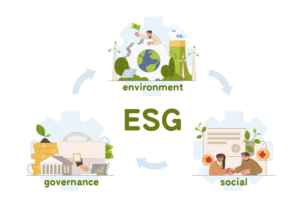 For decades, businesses have measured success through financial growth, market share, and shareholder value. But in today’s world, these metrics alone are no longer enough. Environmental, Social, and Governance (ESG) factors are redefining what it means to be a sustainable and competitive business.
For decades, businesses have measured success through financial growth, market share, and shareholder value. But in today’s world, these metrics alone are no longer enough. Environmental, Social, and Governance (ESG) factors are redefining what it means to be a sustainable and competitive business.
Yet, many organisations still view ESG as a nice-to-have rather than a must-have—a corporate checkbox, a PR strategy, or an unnecessary cost. The reality? Ignoring ESG comes at a far greater cost than most businesses realise, especially in regions like Nigeria and West Africa, where sustainability issues are deeply tied to economic stability and social equity.
The Risks of ESG Neglect
1. The Financial Cost: ESG Failures Hit the Bottom Line
In 2010, BP’s Deepwater Horizon oil spill became one of the most environmentally catastrophic events in modern history. The company not only faced $65 billion in fines and legal settlements but also suffered a 55% drop in share value within weeks. Beyond financial penalties, its reputation took a hit that still affects investor trust today.
BP’s mistake wasn’t just an oil spill—it was a failure in governance, risk management, and environmental responsibility. The lesson? ESG risks are financial risks.
Closer to home, Nigerian oil companies have faced mounting fines and legal disputes due to oil spills, environmental mismanagement, and social unrest. In 2021, Shell agreed to pay $111 million to a Niger Delta community over an oil spill that occurred decades earlier. Beyond the fine, its local operations have been severely affected by conflicts and community resistance, making ESG a direct determinant of business continuity.
Companies that ignore ESG today may face:
- Regulatory fines and lawsuits due to non-compliance
- Loss of investors as financial markets increasingly favour sustainable businesses
- Higher operational costs due to resource inefficiency and waste
A study by McKinsey found that companies with strong ESG practices consistently outperform their peers in stock performance and profitability. ESG is not just an ethical obligation; it’s a financial safeguard.
2. The Reputation Cost: Losing Consumer and Investor Trust
In 2020, fast fashion giant Boohoo faced a scandal when it was revealed that some of its suppliers paid workers as little as £3.50 an hour in unsafe conditions. The fallout was immediate:
- Shares plummeted by 40% within a week
- Retail partners cut ties, forcing the brand to scramble for damage control
- Consumers boycotted the brand, shifting to more sustainable competitors
Reputation is fragile, and in the digital age, it takes one scandal to destroy decades of brand-building.
For African businesses, where social impact and community relationships are critical, reputation loss isn’t just about consumer perception—it directly affects business operations. A Nigerian oil servicing company, for example, can lose access to exploration sites if host communities perceive it as exploitative rather than a development partner.
- Ignoring ESG doesn’t just alienate customers—it creates a brand trust deficit that is difficult, if not impossible, to rebuild.
3. The Regulatory Cost: Governments Are Cracking Down
Across the world, governments are tightening ESG regulations. From the EU’s Corporate Sustainability Reporting Directive (CSRD) to Nigeria’s National Action Plan on Business and Human Rights, companies that fail to comply risk staggering fines, legal action, and loss of operating licenses.
Take Volkswagen’s Dieselgate scandal—when the company was caught cheating on emissions tests, it resulted in:
- $35 billion in fines and settlements
- Executives facing criminal charges
- Severe restrictions on future operations in certain markets
Nigeria’s recent push for more transparency in extractive industries means that oil and gas companies must comply with stringent ESG regulations under the Petroleum Industry Act (PIA). CSR-in-Action’s PIA Implementation Research Report revealed that many host communities still lack clear representation in decision-making—a governance failure that could put companies at risk of non-compliance penalties.
Regulatory compliance is no longer optional. Businesses that delay ESG integration will find themselves playing a costly game of catch-up.
The ESG Imperative: A Business Strategy, Not a Burden
While the cost of ignoring ESG is high, the benefits of integrating it are even higher. Companies that lead in ESG enjoy:
- Stronger investor confidence – ESG-focused funds now exceed $40 trillion in assets
- Higher employee retention – 86% of millennials consider a company’s ESG commitments when choosing where to work
- Increased profitability – Firms with strong ESG frameworks see 14% higher returns on average
Africa’s leading businesses are already responding to this shift. Dangote Group, for instance, has prioritised sustainability and governance as key pillars of its expansion strategy, integrating ESG reporting frameworks into its operations. Nigerian Breweries has also implemented waste reduction and water conservation programmes, demonstrating that ESG is not just about compliance—it’s about competitive advantage.
In today’s business landscape, ESG is not about doing what looks good—it’s about doing what makes sense for long-term resilience.
The question for organisations is no longer “Can we afford to invest in ESG?” but rather “Can we afford not to?”
The cost of ESG neglect is measured in lost trust, legal battles, financial losses, and missed opportunities. Smart businesses are acting now. Will yours?
References
【1】 BP’s Deepwater Horizon Fines – https://www.britannica.com/event/Deepwater-Horizon-oil-spill/Legal-action
【2】 Shell’s Niger Delta Compensation – https://www.dw.com/en/shell-to-pay-111-million-for-1970-niger-delta-oil-spills/a-58697881#:~:text=The%20energy%20giant%20has%20agreed,company%20to%20court%20feel%20vindicated.
【3】 Volkswagen’s Dieselgate – https://www.bbc.com/news/business-34324772
【4】 CSR-in-Action PIA Implementation Report – https://www.sitei.org/pia-research/
【5】 ESG and Employee Retention – https://www.treelyapp.com/post/esg-for-employee-retention
【6】 Dangote’s ESG Strategy – https://www.dangote.com/sustainability/
【7】 Nigerian Breweries Sustainability Practices – https://www.nbplc.com/sustainability/

